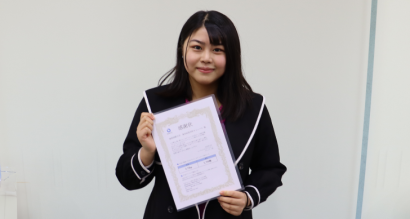JIU Josai International University

Collected 3,750 empty contact lens cases. A student received a letter of appreciation for the "Eye City eco project".
student activities
2023.12.25

インタビューをする学生広報スタッフ(左)と飯塚美紀さん(右 経営情報学部 3年)

Miki Iizuka (3rd year Faculty of Management and Information Sciences) received a letter of appreciation.
Student PR staff Hikaru Miyata (2nd year Faculty of Management and Information Sciences)
The Tokyo Kioicho Campus has been cooperating with the "I City eco project" since April 2023, and was recently presented with a letter of appreciation. Student PR staff interviewed Miki Iizuka, a third-year student Faculty of Management and Information Sciences who is the representative of the volunteer club, including the details of the volunteer club's activities.
Mr. Iizuka decided to start the i-City eco project when he was in high school, and he thought it was appealing because it was so easy to do. However, after entering university, I wanted to do some work on the university campus, but due to the effects of the new coronavirus, I was unable to do so. When I was in my third year at university, I finally decided to start a volunteer club and implement a project.
The Eye City eco project is an activity that reduces CO2 emissions by recycling empty disposable contact lens cases. By remanufacturing, you can make good use of limited resources. In addition, proceeds from recycling are donated to activities to raise awareness and disseminate corneal transplants and eye banks so that people who need corneal transplants can regain their eyesight.
In order to spread the project within the school, the students worked hard to make a strong impression by directly informing first- and second-year students that they were working on the project during their classes, creating promotional posters and membership flyers, and participating in the 3J Festival. In this project, he and a member of the team manually checked each contact case, but since many had aluminum seals left, they had to cut the remaining aluminum seals with scissors. He told me that it was very difficult.
In the end, we collected 3,750 items for this project, which weighs 3.75 kg. In response to this result, Mr. Iizuka said, ``We have to collect more.Next time, we want to exceed 5,000.'' He also said that although store collection is being carried out, it is not widely used, and he hopes that collection at businesses and schools will become more widespread. When I asked them what kind of activities they would like to do in the future in the volunteer club, they expressed their enthusiasm and said they would do anything, such as picking up trash or helping out at events.